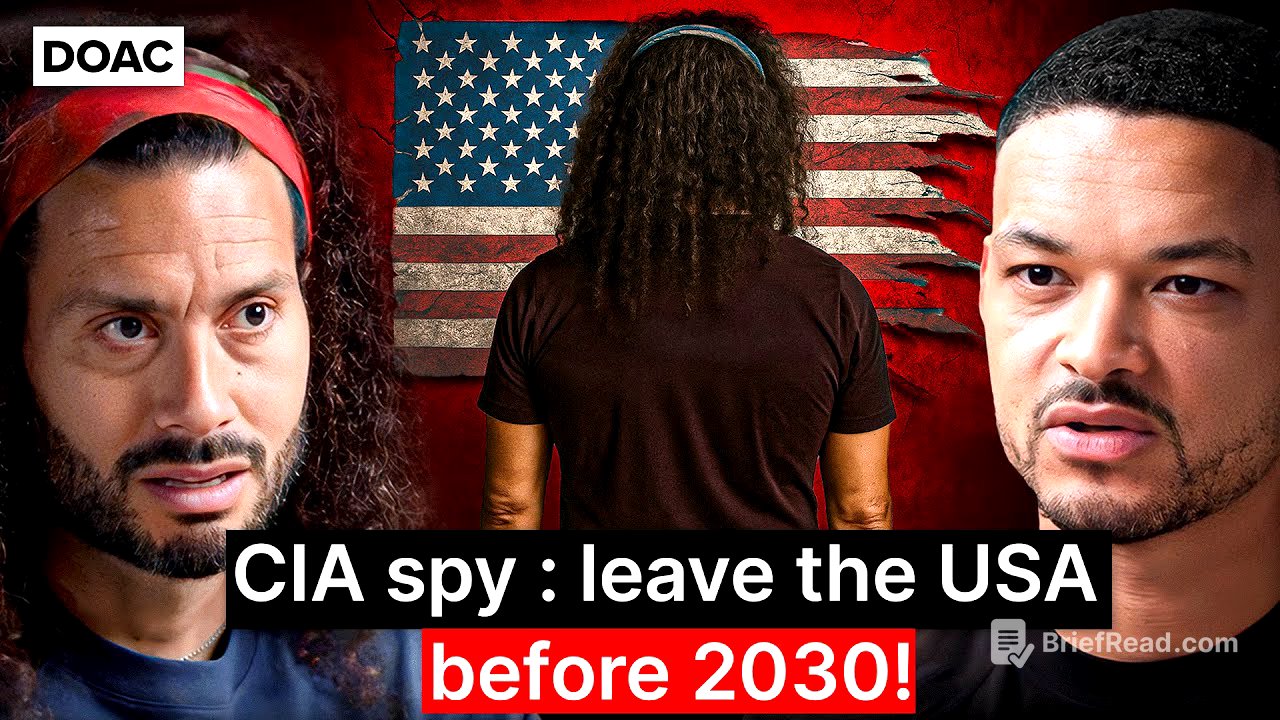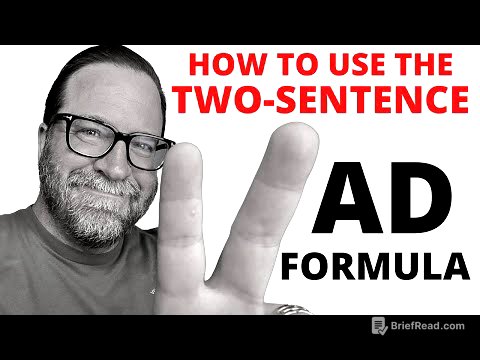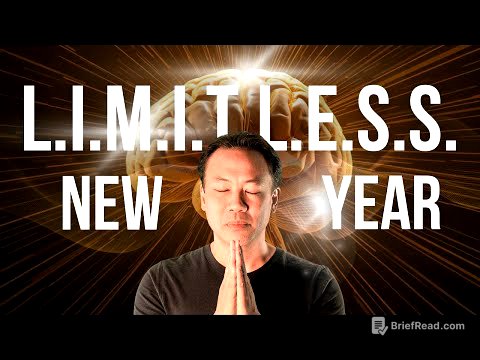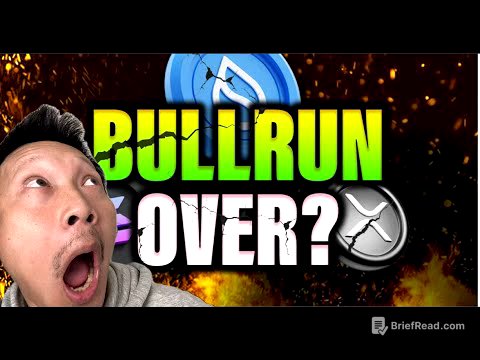TLDR;
Andrew and Jihi Bustamante, former CIA spies, share their untold story of trust, manipulation, and thriving under pressure. They discuss a mission to find a mole within the CIA, the challenges of working undercover, and the moral ambivalence of espionage. They also touch on topics such as privacy, government overreach, and the changing landscape of America.
- The CIA forbade Andrew from telling his story for a long time.
- The CIA is morally ambivalent to how it executes espionage operations.
- Privacy is not real.
A Challenge for DOAC Followers [1:48]
The host challenges viewers to identify the country where Andrew and Jihi were undercover and to guess which of three individuals was the mole within the CIA based on the information presented in the episode. He also encourages viewers to subscribe to the channel to support its growth.
The CIA Has Declassified My Undercover Story [3:19]
Andrew discusses the long process of getting his story approved by the CIA for publication, emphasizing the lifetime secrecy agreement all CIA officers sign. He explains that the CIA initially granted permission to write about his operational background but later revoked it due to changing geopolitics.
Why Didn't the CIA Want Your Story Public? [5:24]
Andrew believes the CIA was hesitant to release his story because it would change people's perception of the agency. He says that the public would realize that CIA is not like the movies and that espionage is a team sport. He also says that the public would understand the depths to which the CIA will dive to collect intelligence that protects Americans. The book discloses a mole that penetrated CIA and new tactics that CIA learned from terrorism and then used against our own most strategic adversaries.
What the Book Reveals About the CIA [6:42]
Andrew explains that a mole is one of the worst things that can happen to an intelligence service, as it involves one of its own officers spying for a foreign adversary. He and his wife were involved in an operation to bait the mole into making a mistake so they could be found and disclosed.
How I Became a CIA Spy [7:01]
Andrew recounts his background, from growing up in rural Pennsylvania to attending the Air Force Academy and becoming a nuclear missile officer. He was recruited by the CIA and met his wife, Jihi, on his first day on the job.
Does the CIA Allow Relationships Between Spies? [8:03]
Jihi explains that dating within the CIA is encouraged because it's difficult to maintain relationships with outsiders due to the need for secrecy. She describes how dating someone outside the CIA requires constant lying and can lead to suspicion and relationship breakdowns.
Your Job Was to Identify People to Capture or Kill [10:33]
Jihi discusses her role as a targeter, which involves identifying individuals for capture or kill for the military. She explains that targeters research and piece together information to determine who is important to capture or kill and how to get to them.
How Did They Work as a Tandem Couple? [12:10]
Andrew explains that his job was to learn what to do after a target identified individuals, such as how to meet, befriend, and win their trust to collect secrets. He and Jihi eventually became a tandem couple, working together as a one-two punch for operations.
Where Does the Story Begin? [13:52]
Andrew says the story begins when he and Jihi were called into a counterintelligence office and told that there was a mole inside of CIA. They were invited to do an operation so that the mole would make a mistake. They were sent across the world to go work in another country while experts in Washington DC tried to find the mole.
The Mission to Find the Mole Who Infiltrated the CIA [15:57]
Andrew explains that their primary objective was to build a new set of reporting assets in Falcon, a hostile country with limited to no diplomatic relationship with the United States. The subobjective was to find the mole, who would try to find them and prevent CIA from collecting secrets about Falcon.
We Were Risking Our Lives Taking This Job [24:20]
Jihi discusses the risks involved in the operation, including the possibility of being disappeared, killed, or imprisoned by a foreign adversary. Andrew adds that CIA officers have plausible deniability, meaning the president can deny their affiliation with the agency.
Did You Have to Change Your Identity? [32:05]
Andrew explains that they were stationed in a friendly neighboring country but had to travel into Falcon. They crafted new identities and aliases to travel out of the friendly country and into Falcon.
What Was Your Undercover Job? [32:58]
Andrew says that when going into Falcon, they used commercial cover, acting as if they were part of a commercial business. He also describes the tradecraft technique of "dry cleaning," where they would clear their path by traveling to a neutral country and changing identities before entering the target country.
CIA Involvement in Illegal Activities [36:23]
Andrew explains that the first thing they were trying to do was find targets. He also says that there's a logistical element to espionage where you need to have encrypted phones, satellite phones or SIM cards, money, and specialized gifts. He says that the CIA would facilitate the transfer of child pornography if needed.
Using Terrorist Tactics [37:31]
Andrew explains that the book's title, Shadow Cell, refers to the terrorist cell model they recreated in their friendly country to execute operations against their hostile country. He says that they learned that CIA was not very good at beating terrorists, so they started building their operations, modeling their operations off of the way the terrorists structured their cells.
What Was Your First Mission? [41:48]
Andrew explains that his job was to go to Falcon to start sourcing the information that Jihi would use to identify individuals. He would pick up dead drops from other case officers and bring them back to Jihi, who would then extract the information.
When Did You Feel Most at Risk? [44:30]
Andrew recounts a time when his presence in Falcon became known to the local government, and they dispatched a surveillance team to track him. He says that the worst is being captured and being interrogated and being used for diplomatic leverage and being forced to do uh you know into brainwashing and propaganda videos.
How Did They Find Out You Were a CIA Spy? [46:07]
Andrew believes that the mole told the enemy country about him. He says that CIA's conclusion as well as the conclusion inside of their own shadow cell is that their operations had reached the place where they were significant enough that the mole took a risk to find out that he was the exposed member of the cell and then the mole reported his name to the hostile country's police force.
Planning My Escape [1:00:36]
Andrew explains that the first effort to escape is always self-rescue. He had to come up with an evacuation plan that wasn't going to let the surveillance team know that he knew he was under surveillance. He called Jihi and gave her a coded message to let her know that something was wrong.
The CIA and Military Black Budget [1:10:34]
Andrew explains that the black budget is the budget of discretionary money that can be spent on military and intelligence operations that isn't tied to the taxpayer. He says that part of that money comes from anytime law enforcement or intelligence agencies seize assets. The other part of the black budget is when an intelligence organization creates a business and that business turns a profit.
Was TikTok Started as a Spy Platform? [1:12:08]
Andrew doesn't believe Tik Tok individually was started as a tool to spy. He believes that what happened is Tik Tok became wildly popular and the government in China realized they could step in and take advantage of it. He also says that social networks have been approached by the CIA or the MI6 and asked to give information to them.
Privacy Is Not Real [1:16:33]
Andrew and Jihi believe that privacy is not real. Jihi says that people are conditioned to believe that they have privacy. Andrew says that if you make yourself easy to be hacked, then you'll actually get hacked less because you're not a risk.
The Jeffrey Epstein Case [1:20:27]
Andrew says that Epstein fits all of the primary pillars of a foreign intelligence asset collecting information on American citizens. He thinks that the most probable outcome is that somebody in the prison was hired to hurt Jeffrey Epstein.
CIA Techniques for Anxiety and Self-Doubt [1:31:54]
Andrew explains that CIA teaches you how to deal with head trash, which is all the terrible things that you say about yourself in your head. They teach you how to handle stress, mitigate cortisol levels in your bloodstream, and lower your heart rate so that you can get back to the task at hand.
CIA Training During Interrogations [1:37:55]
Andrew explains that CIA trains them on how to deal with interviews, how to deal with interrogations, and even how to deal with actual capture and strategic almost like enhanced interrogation. He says that mirroring is a big piece of what you're supposed to do in an interrogation.
Why Did You Leave the CIA? [1:45:12]
Jihi explains that after Andrew was compromised, they found out that they were pregnant. Headquarters decided that they had been so successful and they were continuing to be successful by spreading the cell model to these to the other locations that they wanted them to come home to Washington DC and train officers. They rejected their offer and they said no to soft duty and they put them back and they told them, your family's not our problem.
How the Mole Got Caught [1:50:10]
Andrew explains that FBI created a sting operation based off of the intelligence that they were able to collect through their operations that brought the mole out. He says that the mole was paid hundreds of thousands of dollars to provide information on operations, officers, assets, and locations.
How My Worldview Changed After Joining the CIA [1:58:05]
Jihi explains that when she worked with refugees that was her first big turning point that humans can be really nasty. She says that she realized that anytime somebody says that can't happen here, that's a lie. She also says that you always have to understand that people are a combination of good and bad.
Why We Want to Leave the U.S. by 2026 [2:00:22]
Jihi says that she's been the one who's been pushing to leave for years. She says that she can't shake the reality from Jihei or from her family that Venezuela went from being one of the most successful thriving democracies with a strong economy to what it is now.
How CIA Tactics Changed After 9/11 [2:04:37]
Andrew says that a good life is a life spent doing the things you want to do, the things that bring you joy when you have the age and the energy to do them. He says that he asks himself every day, what can I do right now to maximize the joy that I get right now?
America Is Changing [2:13:51]
Jihi says that the writing on the wall for Americans is that we are transitioning into something new. She says that we will never go back to what we were and that you either need to be a part of creating the new America or you need to start thinking about where else you're going to go because the America we knew before no longer exists and it will never come back.
Should We Be Scared of Where We’re Headed? [2:18:13]
Andrew says that the transition that's happening right now is a transition where the American people have to decide how much they want to get involved and how much they want to let other people just do it for them. He says that we are electing people who will do it for us.
Are We Heading Toward an Economic Collapse? [2:23:24]
Andrew thinks that there's a 60% chance that we don't like where the transition ends and then we spend 15 to 25 years fixing it again. He says that nationalism is not a product of pride, it's a product of fear. He also says that gridlock is going to lead to economic collapse.









